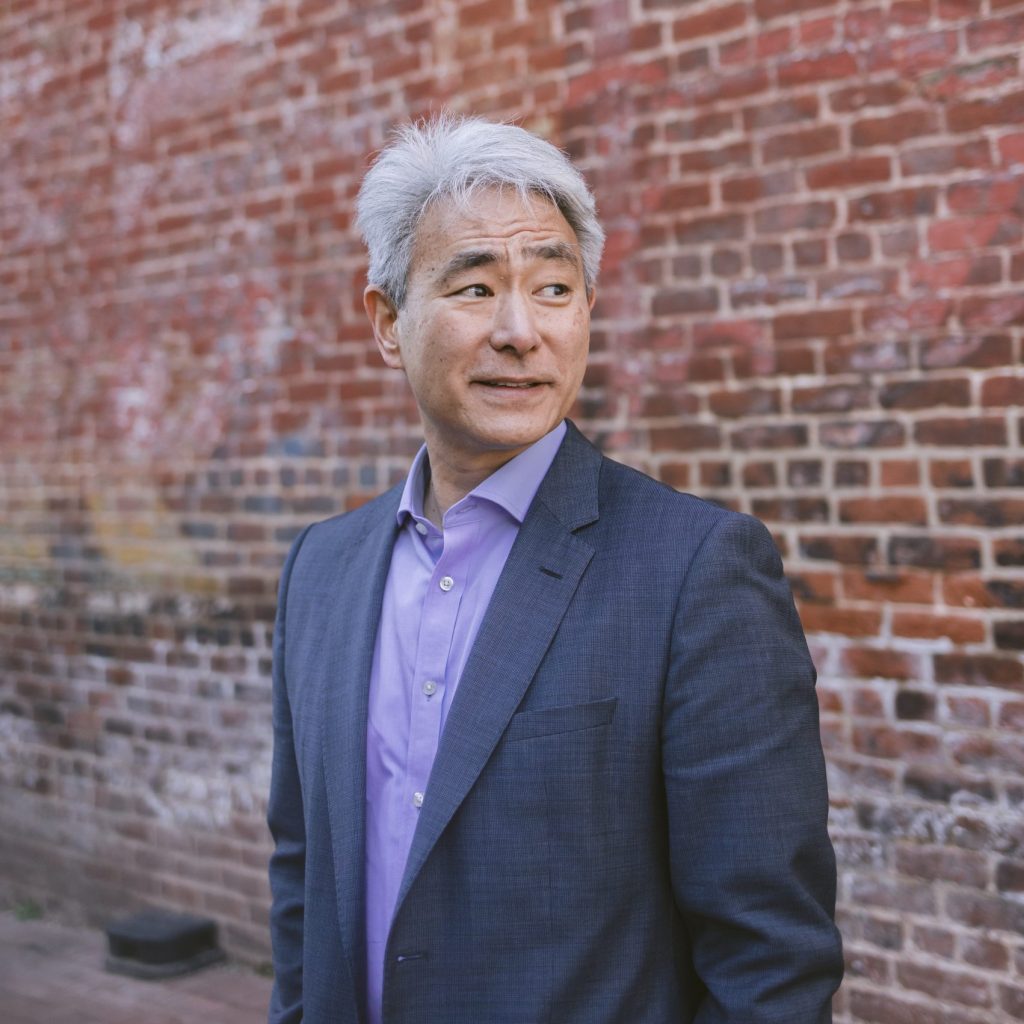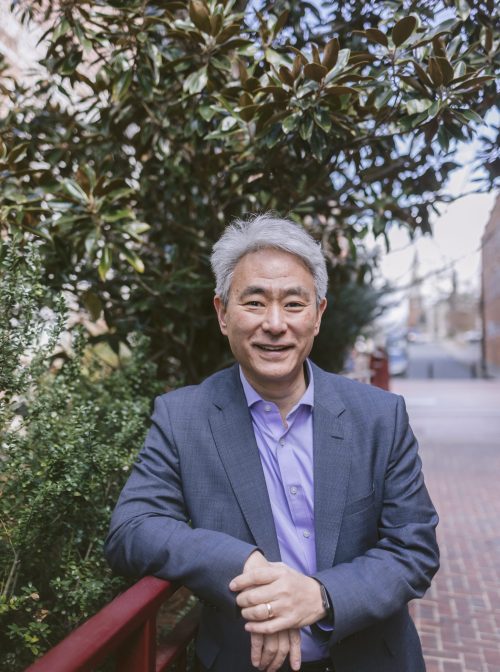Walter Kim is an institution leader and a bridge builder.
The firstborn son of post-Hart-Celler Korean immigrants, Walter Kim was born in the metropolis of New York City and raised in a small coal mining town in the foothills of Western Pennsylvania’s Appalachian Mountains. “It was very much a homogenous, small… white America,” Walter tells me. “I became very accustomed to being the only minority that many people had ever physically known.”
It was here that Kim, through the mentorship of a youth leader, experienced a radical conversion to the Christian faith that began with, as he describes, “a conversation in a parking lot after watching Star Wars,” before coming to fruition at a Korean American Presbyterian conference.
Today, Walter Kim serves as the President of the National Association of Evangelicals (NAE). He is the first non-white president since their founding in 1942. Under Kim’s leadership, the organization seeks to represent and serve evangelicals across America by equipping leaders, supporting churches, transforming social engagement, and more. They are also active in building up communities of faith and bringing greater awareness to the generative contributions of Christian faith in our nation today.
Finding Common Ground
The outworking of Walter’s conversion was deeply present in his early years of undergraduate education at Northwestern University. One evening during the first week of college, Kim found himself hours deep in an invigorating conversation about the meaning of life and the big questions every person encounters at one point or another. “I have a very distinct memory of this,” Kim explains. “Sitting in my dormitory hallway there was an agnostic Jew, an observant Jew, there was a Hindu, an atheist, and a Protestant evangelical Christian.” Although each came from distinct cultural and religious traditions, they were all sitting on the same dormitory floor, exploring these important questions as a learning community.

During the evening, Kim began conversing with a white student who identified himself as a Buddhist. “He was… sitting next to me [and] leaned over to ask me if I was Buddhist because he was hoping to learn Buddhism from someone genuinely from East Asia.” Rather than taking offense to the assumption that he was Buddhist because he phenotypically presented as an East Asian, Kim shared he was a follower of Jesus. By responding gracefully, Kim engendered curiosity in his conversation partner rather than dismay. The experience was illuminating for Kim. He describes it in this way:
“Late into the night… discovered things that held us together in common… We really were jointly asking big questions about God, about life, about where morals come from. But there were also distinct things about our religious traditions. I was learning how to navigate that which held us in common, but also that which distinguished us.”
This late-night dialogue is a landmark in Kim’s longstanding commitment to holding civility and conviction in tension.
Experiences of Evangelicalism
After completing his undergraduate degree in history and philosophy, Kim pursued graduate studies at Regent College in Vancouver and eventually earned a doctorate from Harvard University after nearly a decade studying Near Eastern Languages and Civilizations. His years in and between the academy shaped his imagination of faith and race in America: “I’ve consistently found myself in these spaces of opportunity where my ethnic identity plays a critical role in asking the kinds of questions about faith that are often not asked in different cultural settings.” This imagination has also informed Kim’s current work as President of the National Association of Evangelicals (NAE), an organization that strives to be a home for many expressions of evangelicalism. “Our cultural moment is complicated,” Kim explains. “It requires the ability to think critically and engage charitably.”
Kim recognizes that there is something striking about his identity as an Asian American Christian leading an evangelical organization. He understands his appointment as a reflection of the immigration history of the United States. “There was a basic assumption that what is happening in America reflects in my appointment,” Walter explains to me as he speaks of the global perception of American evangelicalism. “There’s this general recognition that America is on the vanguard of the diversity that exists in other parts of the world, that America has—because of its rich immigration history—often served as that aspirational place where people from all nations could come and immigrate.”
Empathy, when lived out, often looks like an acute awareness of cultures and beliefs that diverge from what is familiar to us.
Kim hopes the growing presence of Asian Americans in evangelical institutions like the NAE, Intervarsity, and The Gospel Coalition will – among other things – push Americans beyond a white-Black binary when Christians talk about race. He points to a historic mythology of Asian immigrants being viewed either as a model minority or perpetually foreign: “Asian Americans often must navigate the perception of either being ‘basically white’… or [seen] as a perpetual foreigner.” In either case, we have a majority culture that does not have a category for those who are neither white nor Black, thus tokenizing and weaponizing Asian Americans.
American… but Not American
Kim is no stranger to competing views of Asian Americans in the United States. Often in Christian spaces, evangelicals go out of their way to assure Kim they “are not colorblind” and “don’t see [Kim] as any different from [them].” Conversely, Kim describes an experience at one white evangelical church which directed him to the international Chinese Bible study because the congregants assumed he was Chinese, and his first language was not English. It is the “paradox [of being] simultaneously seen as no different, completely assimilated into dominant white culture, and as a perpetual foreigner–an outsider,” noted Kim. This is the nuanced complexity of Asian American life within and beyond evangelicalism.
Outside the church, this paradox shows up in the experience of many immigrants who have an identity sourced in both the place they presently live and the place they come from. As Kim describes, it is “a fundamentally bicultural life.” In the past, “those who have immigrated here have by and large sought and worked really hard to assimilate to the American dream, because this is why your parents immigrated to America.” However, no matter how high one can rise in an organization or company, a majority-culture perception of immigrants as “‘American’, but not American, remains.”
The Gift of Empathy
The bicultural life of Asian Americans is far from easy. However, through the trials and challenges of navigating life between “Asian,” and “American,” a comfort with complexity, paradox, and mystery often forms. According to Kim, there is “a comprehensive way of looking at life.” This creates “a set of values that are incredibly important for America in this particular moment where we have to live with the paradox of the pluralism in which we exist.” He continues, “[the ability to] hold on to that which makes you distinct, to have real civility and conviction held together, and living with that nuance I think is incredibly important and it’s a genuine contribution.”
When asked what the greatest contribution Asian American evangelicals can offer to the building of an interfaith America, Kim summarizes his thoughts in one word: empathy. This virtue, Kim explains, expresses uniquely when Asian American experiences combine “with strong biblical teachings to love our neighbors, to pray for our enemies, to love our enemies and pray for those who persecute us, to have empathy and hospitality to the immigrants among us.” Empathy, when lived out, often looks like an acute awareness of cultures and beliefs that diverge from what is familiar to us. Practicing empathy amidst the ethnic and religious pluralism in our society involves telling stories about ourselves and our communities, humanizing one another through compassion, and bringing complex, nuanced, and textured answers to the questions of our shared communities. In short, Kim concludes, we build.
READ THE SERIES
Exploring AAPI Experiences of Religious Identity and Diversity

This article is part of Interfaith America’s AAPI qualitative research and storytelling initiative, which explores Asian American and Pacific Islanders’ experiences of religious identity and diversity in the United States. Stories published as part of this initiative offer key findings from the research and spotlight AAPI changemakers across different religious, civic, and professional sectors.




